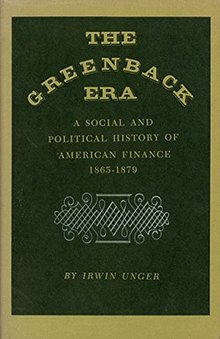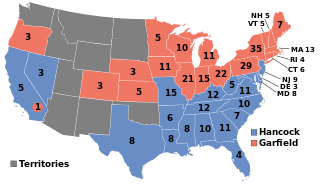
Presidential elections were held in the United States on November 2, 1880. Republican nominee James A. Garfield defeated Winfield Scott Hancock of the Democratic Party. The voter turnout rate was one of the highest in the nation's history. Garfield was assassinated during his first year in office, and he was succeeded by his vice president, Chester A. Arthur.
The Specie Payment Resumption Act of January 14, 1875 was a law in the United States that restored the nation to the gold standard through the redemption of previously unbacked United States Notes and reversed inflationary government policies promoted directly after the American Civil War. The decision further contracted the nation's money supply and was seen by critics as an exacerbating factor of the so-called Long Depression, which struck in 1873.

The Bland–Allison Act, also referred to as the Grand Bland Plan of 1878, was an act of the United States Congress requiring the U.S. Treasury to buy a certain amount of silver and put it into circulation as silver dollars. Though the bill was vetoed by President Rutherford B. Hayes, the Congress overrode Hayes's veto on February 28, 1878, to enact the law. The text of the act can be found in the Congressional Record under the further reading section of this article.

James Baird Weaver was an American politician in Iowa who was a member of the United States House of Representatives and two-time candidate for President of the United States. He belonged to several different political parties over the course of his political career. He joined the Republicans, opposed slavery, and served as an officer in the Union army during the civil war, but after 1876 he switched to the Greenbacks, then the Populists, and finally the Democrats. He trained as a lawyer. Late in his career he served as mayor of Colfax, Iowa. He wrote k, A Call to Action: An Interpretation of the Great Uprising, Its Source and Causes published in 1892 when he was a Populist Party candidate for the U.S. presidency, he later wrote a history of Jasper County, Iowa.
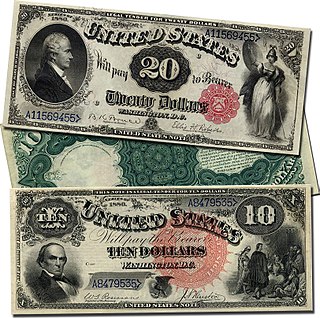
A United States Note, also known as a Legal Tender Note, is a type of paper money that was issued from 1862 to 1971 in the United States. Having been current for 109 years, they were issued for longer than any other form of U.S. paper money other than the currently issued Federal Reserve Note. They were known popularly as "greenbacks", a name inherited from the earlier greenbacks, the Demand Notes, that they replaced in 1862. Often termed Legal Tender Notes, they were named United States Notes by the First Legal Tender Act, which authorized them as a form of fiat currency. During the early 1860s the so-called second obligation on the reverse of the notes stated:
This Note is a Legal Tender for all debts public and private except Duties on Imports and Interest on the Public Debt; and is receivable in payment of all loans made to the United States.
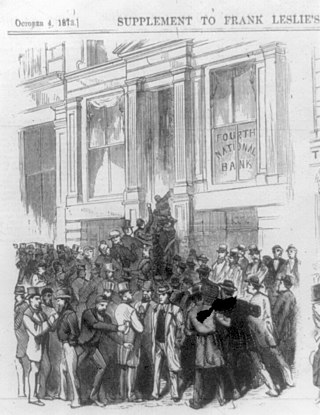
The Panic of 1873 was a financial crisis that triggered an economic depression in Europe and North America that lasted from 1873 to 1877 or 1879 in France and in Britain. In Britain, the Panic started two decades of stagnation known as the "Long Depression" that weakened the country's economic leadership. In the United States, the Panic was known as the "Great Depression" until the events of 1929 and the early 1930s set a new standard.
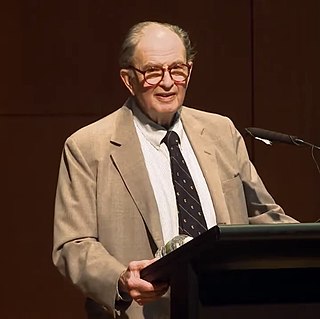
Bernard Bailyn was an American historian, author, and academic specializing in U.S. Colonial and Revolutionary-era History. He was a professor at Harvard University from 1953. Bailyn won the Pulitzer Prize for History twice. In 1998 the National Endowment for the Humanities selected him for the Jefferson Lecture. He was a recipient of the 2010 National Humanities Medal.
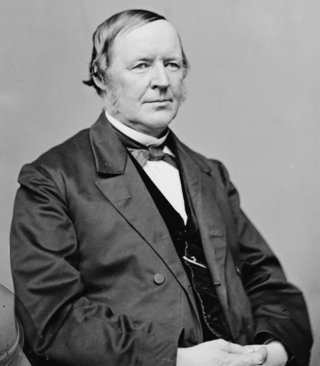
Hugh McCulloch was an American financier who played a central role in financing the American Civil War. He served two non-consecutive terms as U.S. Treasury Secretary under three presidents. He was originally opposed to the creation of a system of national banks, but his reputation as head of the Bank of Indiana from 1857 to 1863 persuaded the Treasury to bring him in to supervise the new system as Comptroller of the Currency 1863–1865. As Secretary of the Treasury 1865–1869 he reduced and funded the gigantic Civil War debt of the union, and reestablished the federal taxation system across the former Confederate States of America. He tried but failed to make a rapid return to the gold standard.

David Herbert Donald was an American historian, best known for his 1995 biography of Abraham Lincoln. He twice won the Pulitzer Prize for Biography for earlier works; he published more than 30 books on United States political and literary figures and the history of the American South.

Princeton University Press is an independent publisher with close connections to Princeton University. Its mission is to disseminate scholarship within academia and society at large.
Steven Howard Hahn is Professor of History at New York University.
The following are the Pulitzer Prizes for 1965.
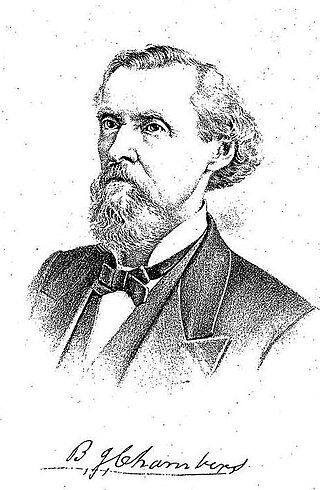
Barzillai Jefferson Chambers was an American surveyor, lawyer, and politician of the Gilded Age. Born in Kentucky, he moved to Texas to join its war for independence against Mexico. Chambers stayed in Texas after its independence and annexation by the United States, earning a living as a surveyor and farmer in Johnson County. In the American Civil War, he served briefly in the Confederate army, then returned to his farming and business interests, becoming part-owner of a bank in his hometown of Cleburne.
Bray Hammond was an American financial historian and assistant secretary to the Board of Governors of the Federal Reserve System in 1944–1950. He won the 1958 Pulitzer Prize for History for Banks and Politics in America from the Revolution to the Civil War (1957). He was educated at Stanford University.
Irwin Unger was an American historian and academic specializing in economic history, the history of the 1960s, and the history of the Gilded Age. He earned his Ph.D. from Columbia University in 1958 and was Professor Emeritus of History at New York University.

The Public Credit Act of 1869 in the USA states that bondholders who purchased bonds to help finance the Civil War would be paid back in gold. The act was signed on March 18, 1869, and was mainly supported by the Republican Party, notably Senator John Sherman.

Liberation was a 20th-century pacifist journal published 1956 through 1977 in the United States. A bimonthly and later a monthly, the magazine identified in the 1960s with the New Left.

James T. Patterson is an American historian, who was the Ford Foundation Professor of History at Brown University for 30 years. He was educated at Harvard University. His research interests include political history, legal history, and social history, as well as the history of medicine, race relations, and education. In 1981–1982, he was the Harold Vyvyan Harmsworth Professor of American History at Oxford University.

The 1880 Greenback Party National Convention convened in Chicago from June 9 to June 11 to select presidential and vice presidential nominees and write a party platform for the Greenback Party in the United States presidential election 1880. Delegates chose James B. Weaver of Iowa for President and Barzillai J. Chambers of Texas for Vice President.

Ulysses S. Grant was the 18th president of the United States (1869–1877) following his success as military commander in the American Civil War. Under Grant, the Union Army defeated the Confederate military and secession, the war ending with the surrender of Robert E. Lee's army at Appomattox Court House. As president, Grant led the Radical Republicans in their effort to eliminate vestiges of Confederate nationalism and slavery, protect African American citizenship, and pursued Reconstruction in the former Confederate states. In foreign policy, Grant sought to increase American trade and influence, while remaining at peace with the world. Although his Republican Party split in 1872 as reformers denounced him, Grant was easily reelected. During his second term the country's economy was devastated by the Panic of 1873, while investigations exposed corruption scandals in the administration. Although still below average, his reputation among scholars has significantly improved in recent years because of greater appreciation for his commitment to civil rights, moral courage in his prosecution of the Ku Klux Klan, and enforcement of voting rights.
